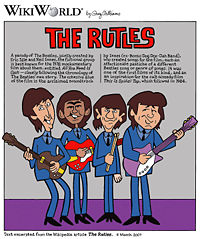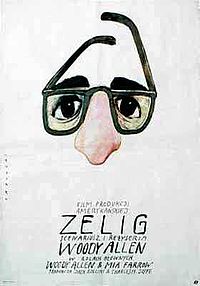- Mockumentary
-
A mockumentary (a portmanteau of the words mock and documentary), is a type of film or television show in which fictitious events are presented in documentary format. These productions are often used to analyze or comment on current events and issues by using a fictitious setting, or to parody the documentary form itself.[1] They may be either comedic or dramatic in form, although comedic mockumentaries are more common. A dramatic mockumentary (sometimes referred to as docufiction) should not be confused with docudrama, a fictional genre in which dramatic techniques are combined with documentary elements to depict real events.
Mockumentaries are often presented as historical documentaries, with b roll and talking heads discussing past events, or as cinéma vérité pieces following people as they go through various events. Though the precise origins of the genre are not known, examples emerged during the 1950s, when archival film footage became relatively easy to locate.[1] A very early example was a short piece on the "Swiss Spaghetti Harvest" that appeared as an April fools' joke on the British television program Panorama in 1957.
The term "mockumentary" is thought to have been popularized in the mid-1980s when This Is Spinal Tap director Rob Reiner used it in interviews to describe that film. It is not known with certainty when the term "mock-documentary" was first used,[2] but the Oxford English Dictionary notes appearances of "mockumentary" from 1965.[3]
Mockumentaries are often partly or wholly improvised, as an unscripted style of acting helps to maintain the pretense of reality. Comedic mockumentaries rarely have laugh tracks, also to sustain the atmosphere, although there are exceptions - for example, Operation Good Guys had a laugh track from its second series onwards.[citation needed]
Contents
Early examples
Early examples of mock-documentaries include David Holzman's Diary (1967), Pat Paulsen For President (1968), Take the Money and Run (1969), and The Rutles (1978). Earlier work, including Luis Buñuel's 1933 Land Without Bread, Orson Welles's 1938 radio broadcast of The War of the Worlds, various April Fool's Day news reports, and vérité style film and television during the 1960s and 1970s, served as precursor to the genre.[2]
A Hard Day's Night (1964), written by Alun Owen, and purporting to describe a couple of days in the lives of The Beatles, was possibly the first feature film that could be characterized as a "mockumentary".
Woody Allen's Take the Money and Run is presented in documentary-style with Allen playing a fictional criminal, Virgil Starkwell, whose crime exploits are "explored" throughout the film. Jackson Beck, who used to narrate documentaries in the 1940s, provides the voice-over narration. Fictional interviews are interspliced throughout, especially those of Starkwell's parents who wear Groucho Marx noses and moustaches.
Early use of the mockumentary format in television comedy may be seen in several sketches from Monty Python's Flying Circus (1969–1974), such as "Hell's Grannies", "Piranha Brothers", and "The Funniest Joke in the World".
Mockumentary since the 1980s
In film
Since the 1980s, the mockumentary format has enjoyed much attention, especially in the directorial work of Spinal Tap star Christopher Guest. Films such as Best in Show, Waiting for Guffman, and A Mighty Wind, penned by Guest and co-star Eugene Levy, were critical successes.
Zelig was a 1983 American mockumentary film written and directed by Woody Allen, and starring Allen and Mia Farrow. Allen plays Zelig, a curiously nondescript enigma who is discovered for his remarkable ability to transform himself to resemble anyone he's near.
In 1995 Forgotten Silver, claimed New Zealand filmmaker Colin McKenzie was a pioneer of most aspects of filmmaking. When it was revealed to be a mockumentary, director Peter Jackson received much abuse for tricking the nation.
Borat is a successful film from the 2000's which uses this style, and the 2007 film, Surf's Up, is an example of an animated mockumentary.
In television
In television, the most notable mockumentaries in the 2000s have been: ABC Australia's The Games (Australian TV series) (1998-2000), the British shows Marion and Geoff (2000), The Office (2001) and its many international offshoots, the Little Britain spin-off Come Fly with Me (2010), which follows the activity at a fictional airport and its variety of staff and passengers.
Other successful television mockumentaries include the American sitcoms Parks and Recreation (which debuted in 2009), and Modern Family (which also debuted in 2009); the Australian shows Angry Boys, Summer Heights High , and We Can Be Heroes: Finding The Australian of the Year; and the Canadian series Trailer Park Boys.
See also
- Found footage (genre)
- List of mockumentaries
- Pat Paulsen
Literature
- Cassady, Charles L 2005.: Videohounds Reality Check: Documentaries, Mockumentaries and Related Films.
- Rhodes, Gary D. (ed.) 2006: Docufictions. Essays on the intersection of documentary and fictional filmmaking. Jefferson, NC: McFarland.
- Roscoe, Jane/Hight, Craig 2001: Faking it. Mock-documentary and the subversion of factuality. Manchester/New York.
External links
- Lists of Mockumentary at UC Berkeley Mockumentary Collection
- Mockumentary - Reflexivity, satire and a call to play
- What is a mockumentary?
- (Italian) Mockumentary - Il regno dell'(in)verosimile
Definitions
- Mockumentary definition at Merriam-Webster
- Mockumentary definitions at Collins English Dictionary and Dictionary.com's 21st Century Lexicon
- Mockumentary definition at Urban Dicitonary
References
- ^ a b Campbell, Miranda (2007). "The mocking mockumentary and the ethics of irony". Taboo: The Journal of Culture and Education 11 (1): 53–62. http://freireproject.org/files/Taboo2007BoratIssue.pdf#page=52. Retrieved 2010-07-26.
- ^ a b Roscoe, Jane; Craig Hight (2001). Faking it: Mock-documentary and the Subversion of Factuality. Manchester University Press. ISBN 0719056411.
- ^ "mockumentary, n.". Oxford English Dictionary. Oxford University Press. 2010 draft entry. http://dictionary.oed.com. Retrieved 2010-07-28.
Categories:- Mockumentaries
- Fiction forms
- Film genres
- Television genres
- Comedy genres
- Documentary film genres
Wikimedia Foundation. 2010.


